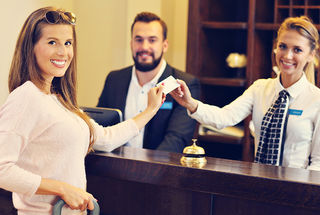How to Use Psychology for Increasing Your Business Travel Bookings


Rockport Analytics surveyed and stated that the business travel segment witnessed a growth, from being at $1.3 trillion in 2016 to $1.7 trillion in 2021.
The hotel industry is in pursuit of adapting trends and technologies to attract business travelers on their corporate travel.
However, the success of the hospitality industry in attracting business travelers depends on the ability to understand psychology.
So, how can psychology in the hotel industry help you attract the business travel audience?
The ability to deal with human beings can enhance your business’s success in the service industry.
What principles can you use to connect with individuals on corporate business travel?
Have a look.
Principles of Psychology in the Hotel Industry
Michael Lynn developed different principles of psychology for the hotel industry to increase booking results and guest retention. The principles include professionalism, personalization, positive emotions, and surprise.
For example, positive emotions ensure customer satisfaction, and a smiling employee can create a positive feeling in the guest.
Also, the element of surprise is also critical in the hospitality industry. Your guests will value unexpected gifts and will respond positively to them.
Here are four important principles of psychology to improve your hospitality skills and attract the right business travel audience to your hotel.
- Personalization
Personalization relates to psychology because we need to relate to other humans. Personal interaction with others cannot be suppressed by other pleasures in life. It is one reason solitary confinement—self-imposed or forced—is so painful and harmful to the mental state.
Your staff can smile during the business guest interaction to evoke positive emotions. They can introduce themselves by name to make the relationship more personal.
Also, use the name of the guest on their business trip to avoid treating them like an anonymous passerby. So, you can say ‘Hello Mr. XXX’ instead of ‘Hello Sir’. This also makes the guests feel important.
- Positivity
Positivity in psychology is linked to perspective. In hospitality, positivity can be a powerful technique for altering the perspective of business travelers. Your hotel staff should speak about pleasant things and focus on offering sincere compliments.
Also, your staff should avoid engaging guests with tales of things gone wrong. They should converse about pleasant things, like the lack of traffic, weather, the beautiful view, etc.
- Professionalism
Your hotel staff should maintain a professional attitude toward the business guests. They should not complain about the current work situation in front of or to the guests. They should never gossip about other guests and use professional, polite language.
The hotel staff should be presentable. From head to toe, your workforce should maintain a professional appearance to showcase your hotel brand’s professionalism and increase customer satisfaction and retention.
- Surprise
Pleasant surprises are an important principle of psychology. People love being surprised by the level of service they are offered, which is one of the simplest psychology principles to apply to your hospitality business.
You should focus on giving more than what your business guest expects from your hotel brand. Integrate different latest and modern tools and technologies to simplify the work operations of a working professional.
You can also provide surprise entertainment like weekend nights, gatherings in a casual lounge, serving complimentary drinks, etc.
Apart from these principles, here are some general psychological practices you can implement in your hotel business operations.
Psychology Practices in the Hospitality Industry to Attract Business Travel Bookings
Multiple psychological practices and tactics can improve the acquisition and retention of a new business traveler. Here are the best ways.
- A better understanding of customers and employees
Your hotel managers must understand the personality traits of employees and customers as an important step toward improving your hospitality service.
The managers should be experts in handling customer complaints and should understand the psychology behind the claims. They should understand the differences in personalities among employees and customers to deal with them differently.
Better employee and customer management can improve the overall results of your hotel business and ensure a rise in your corporate bookings.
- Focus on customer experience
Psychology in hospitality is explained by how you can make the accommodation more appealing. With increasing competition, you must develop new strategies to deliver a quality customer experience for your business travelers.
Modern corporate travelers are highly responsive to hospitable behavior. They want the best ecosystem to handle their work during their stay.
Business travelers today focus more on quality than quantity. The valuable experience and authenticity of the hotel brand matter. Corporate travelers want to be heartily welcomed as guests in a local community.
Your staff should be ready to welcome the travelers as guests. They shouldn’t be hesitant to chat with the business guests. A warm welcome can help make the visit distinct, and your guests can recommend other prospecting visitors about the positive customer experience at your property.
With positive word-of-mouth marketing, you can book more corporate business travelers and increase your booking frequency.
- Ensure customer loyalty
Retaining your business travel client is the most critical aspect of your marketing and psychology.
You can offer exclusive hotel booking discounts and special offers for your corporate guests to increase your bookings and minimize customer churn.
Discounts can help you attract high-involvement customers and help you bypass economic downturns, which severely affect the hospitality industry.
Discounts can also attract customers and ensure customer loyalty. Multiple hotels offer lucrative discounts to frequent business travelers to maintain customer loyalty.
But many luxurious hotels offer discounts to strengthen their market base. When hotels extend these opportunities to guests, guests can help to advertise the hotels on social media platforms.
Also, studies suggest that offering discounts to guests has more than monetary benefits. The price discounts help to create emotional responses apart from financial benefits.
Corporate customers can make more purchases because of the discount savings. They can also experience positive feelings when your hotel offers them discounts.
Also, guests will talk more about the overall experience of getting discounts within their professional network to increase their chances of more corporate bookings.
The primary goals for every hospitality business are profit maximization, survival, and growth. To achieve your goals, you must devise appropriate psychology and marketing strategies.
Psychology for the hospitality industry is an effective way of marketing. Any good business owner should use the psychological principle in their service business.
Summing Up
The hospitality industry is about human interaction, how your team talks, how they welcome business guests, and how they make them comfortable on the property.
With great psychological marketing strategies, you require best-in-class hotel business management software to streamline workflows and deliver an excellent customer experience.
AxisRooms offers advanced hospitality tech solutions to help you and your team manage and run the hotel business.
We can help you manage workflows and attract corporate business travelers to your property. You can save time and effort and utilize it to excel your business in other directions.
Check out our website to better understand what we offer at AxisRooms.
AxisRooms Editorial Desk
AxisRooms, a software suite provider for the hospitality industry, is committed to aiding your business growth, not just with our state-of-the-art products and services, but also with the latest updates from the travel and hospitality industry. Got something to say? Write to us at : [email protected]
